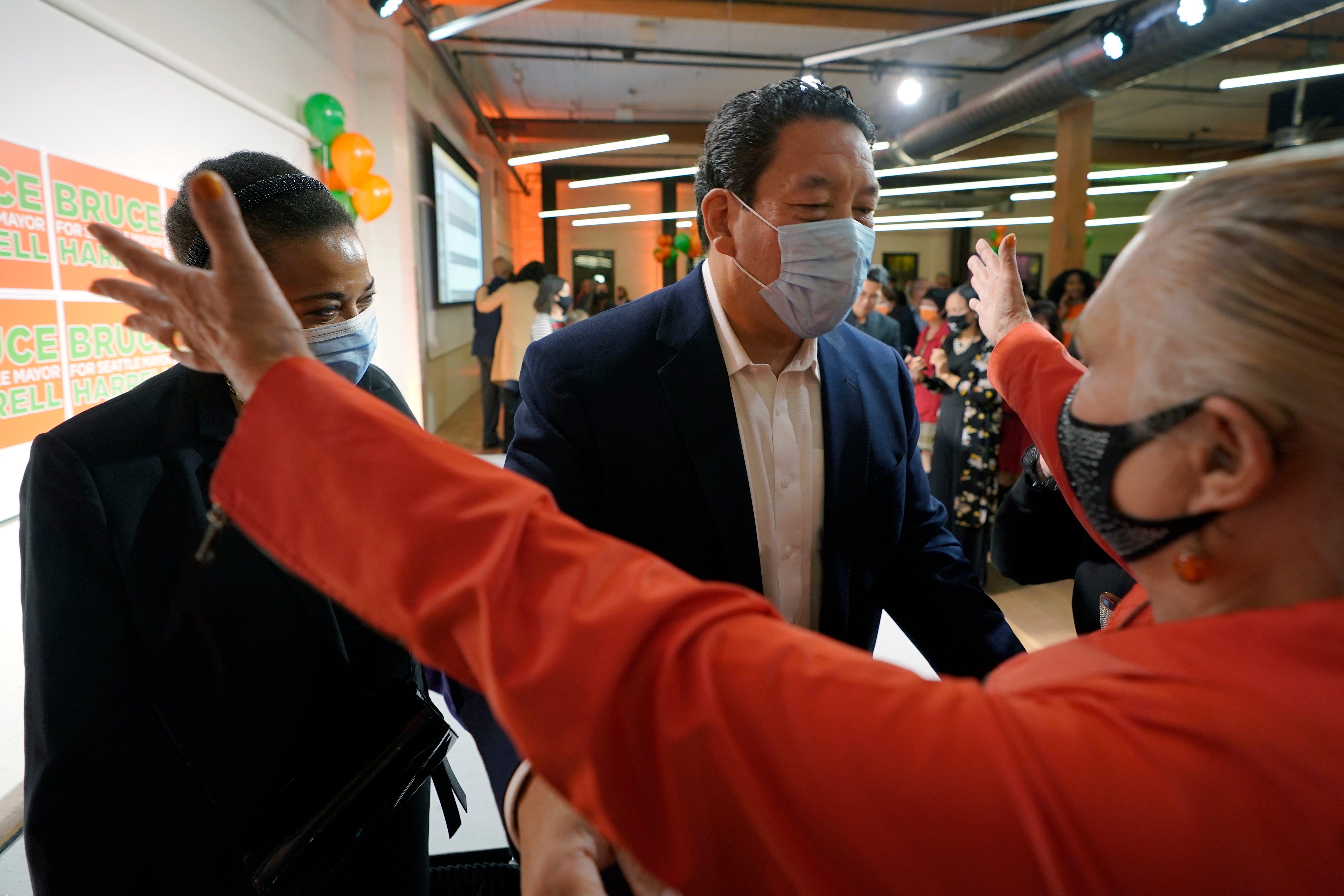Defund the police candidates stumble in liberal Seattle
Seattle’s downtown business community is celebrating as the moderate candidates it backed take commanding leads in the races for mayor, city attorney and a key council race over liberals who had called to defund the police

Your support helps us to tell the story
From reproductive rights to climate change to Big Tech, The Independent is on the ground when the story is developing. Whether it's investigating the financials of Elon Musk's pro-Trump PAC or producing our latest documentary, 'The A Word', which shines a light on the American women fighting for reproductive rights, we know how important it is to parse out the facts from the messaging.
At such a critical moment in US history, we need reporters on the ground. Your donation allows us to keep sending journalists to speak to both sides of the story.
The Independent is trusted by Americans across the entire political spectrum. And unlike many other quality news outlets, we choose not to lock Americans out of our reporting and analysis with paywalls. We believe quality journalism should be available to everyone, paid for by those who can afford it.
Your support makes all the difference.Seattle s downtown business community celebrated Wednesday after the moderate candidates it backed took commanding leads in the races for mayor, city attorney and a key council race over liberals who had called to defund the police.
“This election was a choice: Do you want more performative dysfunction, or candidates who are going to unify people and deliver results,” said Jon Scholes, president of the Downtown Seattle Association.
Tuesday's election was vastly different from city contests two years ago, when business-backed candidates fared poorly against liberals who argued that huge companies like Amazon had too much sway in the Northwest's largest city.
It could be days before final margins are known, due to Washington state's all-mail ballot system. But the strong showing by candidates who objected to the push to radically alter policing buoyed people who felt a different approach to public safety and homelessness was needed.
The results also echoed setbacks for far left candidates elsewhere in the U.S. New York City elected as mayor a former police officer who ran a public safety campaign.
In Seattle, Bruce Harrell, a former City Council president who urged adding police, including unarmed officers, rather than cutting funding, held a commanding lead of nearly 30 percentage points over current Council President Lorena González as additional ballots were counted Wednesday.
The 63-year-old Harrell, who grew up in a redlined Seattle neighborhood, would be the city’s first Asian American and second Black mayor if the results hold.
Amid the racial justice protests that followed George Floyd's murder by Minneapolis police last year, González embraced calls to cut the Seattle Police Department’s budget in half — a position she has since softened.
First-term Mayor Jenny Durkan did not seek re-election.
Republican Ann Davison was leading police- and jail-abolitionist Nicole Thomas-Kennedy in the race for city attorney — a position that involves prosecuting minor crimes, advising city leaders on legal matters and representing the city in lawsuits.
While Seattle's municipal elections are officially nonpartisan, it was notable that a candidate who had identified as a Republican — albeit one who said she voted for Joe Biden, Hillary Clinton and Barack Obama — could prevail in the overwhelmingly Democratic city.
In one of the two City Council races, business-friendly brewery owner Sara Nelson was leading Nikkita Oliver, an attorney and activist who founded an arts-based alternative to jail for young people. In the other, incumbent Teresa Mosqueda, who has strong support from organized labor, appeared to be holding onto her seat despite an unexpectedly strong showing from little-known civil engineer Kenneth Wilson.
Liberal candidates in Seattle tend to gain ground in later vote counts, but the moderate slate holds very strong leads.
This year's elections have attracted more than $10 million in political contributions, a record for the city.
In the mayor's race, González had vowed to end sweeps of homeless encampments when residents had few options for where to go, and she said economic recovery should focus on neighborhoods throughout the city, not just downtown.
That offered voters a false choice, Scholes said: It suggested voters were uncompassionate if they believed parks should be accessible to everyone, or if public drug use made them feel unsafe.
“The candidates who did well were the candidates that met people where they were and didn't shame them," he said.
Andrew Villeneuve, founder of the Northwest Progressive Institute, a liberal think tank, said he didn't expect the city to suddenly lurch to the right. But it should wake up the more liberal council members to the reality that they need to listen to all voters, not just activists.
“I think what you’re going to see is the same dynamic that we’ve had: a progressive council pushing a mayor who is a little more business-friendly to do things they might push back on."
Doug Trumm, executive director of The Urbanist, a progressive website in Seattle, called the results “a setback for a lot of causes,” including fighting climate change and adding housing density.
“It’s easy to talk about clearing encampments,” he said. "It’s hard to get people into housing.”
___
Associated Press videographer Manuel Valdes contributed.